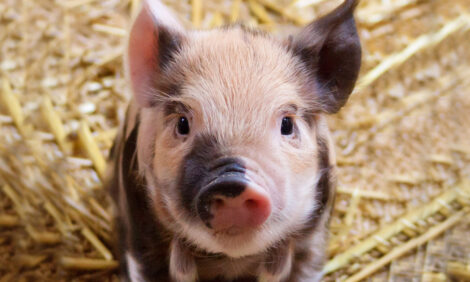



Know your options to diagnose Ileitis
A commentary from David Bane, DVM, Elanco Animal Health, discussing the ways to diagnose and treat ileitis and confirming vigilance is still the key to limiting this costly disease.
For many farmers, the disease they find is ileitis. However, arriving at such a diagnosis often involves using several diagnostic methods.
Checking for clinical signs includes looking for things such as sudden diarrhoea, increased variation or dark, runny stools (see picture), decrease in average daily gain, poor feed efficiency and gaunt hogs. Faecal samples used in PCR tests are designed to show the presence of L. intracellularis. While an accurate and relatively inexpensive test, the animal must be shedding the bacterium to result in a positive test. Therefore, PCR could lead to false negatives. IleiTest quickly and accurately evaluates a herd's risk for ileitis. Through blood sampling, IleiTest provides 91% sensitivity to L. intracellularis, exceeding the PCR test's 39% sensitivity.
Rodibaugh concurs, "I've been surprised sometimes after post-mortems to find lesions from ileitis even when we did not observe diarrhoea in the pigs. This being the case, it makes sense to take some preventive measures and get a good diagnosis before an ileitis problem becomes severe." Bane adds, "Tylan in the feed gets to the core of the problem by controlling the bacteria that causes ileitis. And that means farmers can still protect their herds and profits.
Tylan Premix ® is the only FDA-approved product for the prevention and control of ileitis.
Ileitis symptoms have been recognised for years, but positive identification of its cause remained elusive until the mid '90s. Elanco Animal Health, a long-time collaborator with swine researchers around the world, has invested millions of dollars and years of study in understanding all aspects of ileitis. In 1996, Elanco's Tylan Premix® received the first and only FDA approval for prevention and control of this costly disease. Today, Tylan remains U.S. veterinarians' first choice for ileitis treatment.
Why not find out more about Tylan Premix® or alternativley visit the Elanco Animal Health web site.
Tylan® is a trademark for Elanco's brand of tylosin.
 As ileitis attacks the lower small intestine (ileum), it impairs digestion and can lead to clinical symptoms such as diarrhoea, which can cause loose watery stools
|
Live diagnosis
Detecting ileitis or its causative pathogen. Lawsonia intracellularis, in live pigs is often preferred since the animal does not need to be sacrificed. Options include: checking for clinical signs of ileitis, collecting faecal samples for polymerase chain reaction (PCR) tests, and performing serology such as the IleiTest immunofluorescence assay test.Checking for clinical signs includes looking for things such as sudden diarrhoea, increased variation or dark, runny stools (see picture), decrease in average daily gain, poor feed efficiency and gaunt hogs. Faecal samples used in PCR tests are designed to show the presence of L. intracellularis. While an accurate and relatively inexpensive test, the animal must be shedding the bacterium to result in a positive test. Therefore, PCR could lead to false negatives. IleiTest quickly and accurately evaluates a herd's risk for ileitis. Through blood sampling, IleiTest provides 91% sensitivity to L. intracellularis, exceeding the PCR test's 39% sensitivity.
Post-mortem diagnosis
To get a highly accurate diagnosis, many turn to post mortem exams. Here, farmers can choose from a gross necropsy, a histopathologic exam or slaughter evaluation. In a gross necropsy, veterinarians look for proliferative lesions in the ileum, which indicate ileitis. Several methods of histopathology allow the study of cells to determine if they are infected with L. intracellularis. In a slaughter-check, inspectors can visually and physically examine pig intestines for signs of ileitis.Human factor critical
While new diagnostic tools make identifying ileitis easier, experts say it doesn't replace paying close attention to herd performance and taking preventative steps against the disease. "I tell people to look for sudden changes in color and / or consistency of the pigs' stools," says Max Rodibaugh a U.S. veterinarian. "If ileitis is present the stool may become loose and the color will often be dark red to brown. The pigs may drop off in performance and become thin as well" While acute ileitis causes sudden death in pigs, many operations suffer from the more subtle, chronic form of the disease. More difficult to detect, chronic ileitis can cause significant losses in herd performance if a prevention strategy is not in place.Ileitis typically causes pigs to lose appitite, lose weight, have poor feed conversion and appear gaunt. Affected pigs may have visible backbones (left).
|
Early detection essential
David Bane, DVM, Elanco Animal Health, says early detection of ileitis is essential to minimise production losses. "Unfortunately, sometimes identification of ileitis may be difficult since it can be masked by other diseases as it remains at a subclinical level."Rodibaugh concurs, "I've been surprised sometimes after post-mortems to find lesions from ileitis even when we did not observe diarrhoea in the pigs. This being the case, it makes sense to take some preventive measures and get a good diagnosis before an ileitis problem becomes severe." Bane adds, "Tylan in the feed gets to the core of the problem by controlling the bacteria that causes ileitis. And that means farmers can still protect their herds and profits.
Tylan Premix ® is the only FDA-approved product for the prevention and control of ileitis.
Seeking a solution
 Different forms of Tylan®
|
Why not find out more about Tylan Premix® or alternativley visit the Elanco Animal Health web site.
Tylan® is a trademark for Elanco's brand of tylosin.







